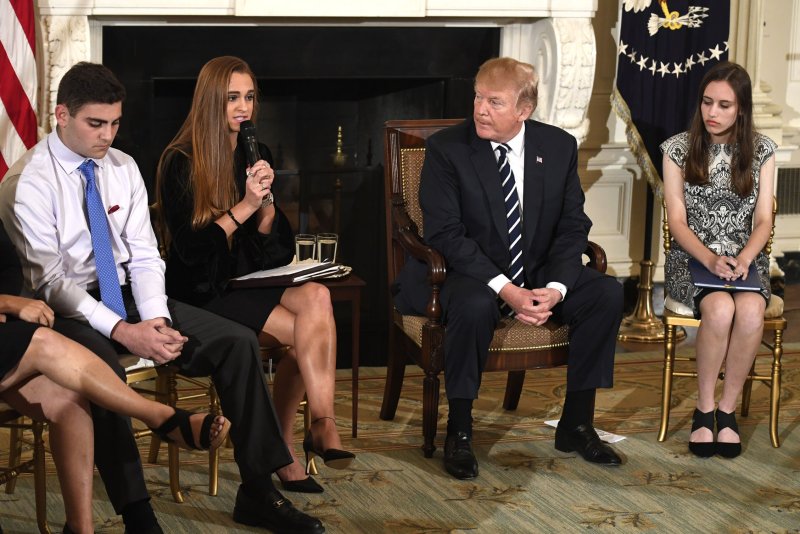1 of 11 | President Donald Trump (2nd-R) listens to Marjory Stoneman Douglas High School student body President Julia Cordover as surviving students attend a listening session on school violence at the White House on Wednesday. Photo by Mike Theiler/UPI |
License Photo
Feb. 21 (UPI) -- President Donald Trump promised more stringent background checks and mental health screenings for people seeking to purchase guns during a listening session with student survivors of last week's shooting at a South Florida high school.
During the meeting, which was expected to lay groundwork for future change, Trump took suggestions from survivors of the shooting at Marjory Stoneman Douglas High School in Parkland that killed 17 people last week. Also attending were representatives from the shootings at Columbine High School in 1999 and Sandy Hook Elementary School in 2012.
"We're going to be very strong on background checks," Trump told the room of students, parents and education officials. "It's not going to be talk like it has been in the past. It's been going on too long. Too many instances, and were going to get it done."
A day earlier Trump announced he signed a directive calling on Attorney General Jeff Sessions and the Justice Department to craft legislation banning bump stocks and other devices that turn semi-automatic firearms into automatic weapons.
After Trump addressed the crowd, attendees shared their stories and offered solutions for gun violence in schools.
Marjory Stoneman Douglas student Justin Gruber, 15, said he was born after the Columbine shooting and "into a world where I never got to experience safety and peace."
"People should be able to feel like when they go to school it can be safe. There needs to be a change. People need to feel safe. Parents shouldn't have to go through the idea of losing their child," Gruber said.
Andrew Pollack, whose daughter Meadow Pollack was killed in the Parkland shooting asked "how many children have to get shot" before the issue is resolved.
"It should have been one school shooting, and we should have fixed it, and I'm pissed," he said.
Pollack called on legislators to create new school safety measures before adopting new gun restrictions.
"It's not about gun laws right now -- that's another fight, another battle," he said. "We need our children safe."
Frederick Abt, father of Parkland survivor Carson Abt, suggested having teachers volunteer to receive training and keep firearms "safely locked in the classroom" or hire armed undercover police officers as custodians or cafeteria workers on campus.
Trump said he and legislators will discuss the idea of allowing teachers with firearm experience to carry concealed weapons on campus to limit response time in the event of a shooting.
"This would be obviously only for people who were very adept at handling a gun, and it would be, it's called concealed carry, where a teacher would have a concealed gun on them. They'd go for special training and they would be there and you would no longer have a gun-free zone," Trump said. "Gun-free zone to a maniac -- because they're all cowards -- a gun-free zone is 'let's go in and let's attack because bullets aren't coming back at us."
The dean of students at Washington D.C.'s Friendship Public School Technology Preparatory Middle said he opposes the idea of arming teachers and noted his school employs checkpoints which include metal detectors and X-ray machines.
Trump also called for more mental institutions and hospitals citing the lack of a "middle ground" for people who exhibit signs of mental illness but haven't committed a crime.
"Today if you catch somebody they don't know what to do with him, he hasn't committed the crime but he may very well and there's no mental institution there's no place to bring them," he said.
Nicole Hockley, whose 6-year-old son was killed at Sandy Hook, called for mental health services to identify individuals with a lack of "mental wellness," which she said is characterized by anger and fear, and can't be diagnosed.
"Rather than arm [teachers] with a firearm, I would rather arm them with the knowledge of how to prevent these acts from happening in the first place," she said.
Marjory Stoneman Douglas student Samuel Zeif cited laws in Maryland banning multiple types of assault weapons and magazine size as an effective form of gun control.
"The Second Amendment I believe was for defense and I fully respect that, but these are not weapons of defense, these are weapons of war," he said. "And I still can't fathom that I am able to purchase one."
Students from Marjory Stoneman Douglas and other schools from California to Washington, D.C., held walkouts and rallied outside the White House and Florida's state capital Wednesday.
Demonstrators in Tallahassee waved signs and chanted, "Never again!" and "Shame on you!" after state legislators voted down a bill that would prevent the sale and possession of assault weapons.
Another discussion is scheduled to take place later Wednesday night in the form of a televised town hall aired by CNN. Held at 9 p.m. EST at the BB&T Center in Sunrise, Fla., anchor Jake Tapper will moderate a group of students, parents, politicians and gun rights advocates to talk about gun laws.
Rep. Ted Deutch, D-Fla., and Sens. Marco Rubio, R-Fla., and Bill Nelson, D-Fla., agreed to attend the event. Trump and Florida Gov. Rick Scott each declined invitations to appear.















